Sleuth Blu-ray Movie
HomeSleuth Blu-ray Movie 
Sony Pictures | 2007 | 86 min | Rated R | Mar 11, 2008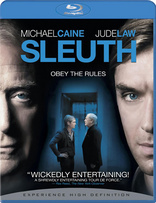
Movie rating
6 | / 10 |
Blu-ray rating
| Users | 3.6 | |
| Reviewer | 3.0 | |
| Overall | 3.4 |
Overview
Sleuth (2007)
A dramatic and thrilling study of sexual conflict, jealousy, power and manipulation handled with both lacerating wit and humour, Sleuth tells the story of a wealthy writer of detective stories and an aspiring yet out-of-work actor who is having an affair with the writer's wife. The writer's exquisitely modernized Georgian manor becomes the backdrop for a cat and mouse game that pits one creative mind against another.
Starring: Michael Caine, Jude Law, Harold PinterDirector: Kenneth Branagh
| Drama | Uncertain |
| Psychological thriller | Uncertain |
| Mystery | Uncertain |
| Thriller | Uncertain |
Specifications
Video
Video codec: MPEG-4 AVC
Video resolution: 1080p
Aspect ratio: 2.35:1
Original aspect ratio: 2.39:1
Audio
English: Dolby TrueHD 5.1
Spanish: Dolby Digital 5.1
Portuguese: Dolby Digital 5.1
Subtitles
English, English SDH, French, Portuguese, Spanish
Discs
50GB Blu-ray Disc
Single disc (1 BD)
Playback
Region free
Review
Rating summary
| Movie | 2.5 | |
| Video | 4.0 | |
| Audio | 4.0 | |
| Extras | 2.5 | |
| Overall | 3.0 |
Sleuth Blu-ray Movie Review
"You know what the word adapted means, I take it?"
Reviewed by Casey Broadwater June 16, 2009Like it or not, our recent cinematic age has been defined by the remake, the re-imagining, and the reboot. Horror was the first to be hit by the torrent of re-churned titles, and the flood has slowly risen, overtaking a progression of more reputable genres. Superhero and sci-fi flicks came next, and now we’re seeing thrillers and even strait-up dramas being overwhelmed by the rising tide of re-hash. There are myriad reasons for this trend—studio cowardice, artistic bankruptcy, and heaps of cash among them—but a precious few of these re-shoots attempt some genuine post-modern reflection and refraction, splintering their source material and reassembling the shards into something brave and new. When word came that Sleuth, the 1972 thriller from director Joseph L. Mankiewicz—itself adapted from Anthony Shaffer’s stage play—was going to be remade, I was mildly interested. After learning, though, that Nobel Prize laureate Harold Pinter would write an all-new screenplay for the project, Kenneth Branagh would direct, and that Michael Caine would return in the opposite role from the one he once played, I was understandably intrigued. Unlike most, this was a low profile, high concept remake I could wrap my head around. Unfortunately, after viewing the film, I can’t say that I was entirely taken by Sleuth’s chilly new direction. There are some good ideas at work in the film, but like most recreations, it suffers under the law of diminishing returns.
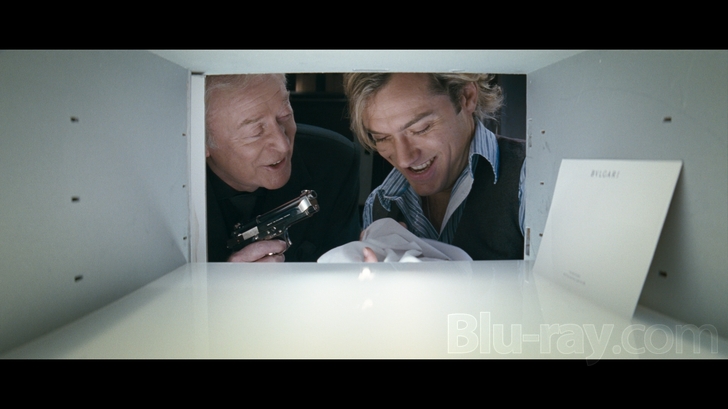
No, this isn't a buddy heist comedy.
There is a telling moment in this new iteration of Sleuth, in which Michael Caine and Jude Law, as Andrew Wyke and Milo Tindle, are standing before a projected image of themselves on a wall. There is a camera pointing at them, generating the image, and this creates a video feedback loop, in the same way that you see an infinite regression when you plug a camcorder into a television and then point the lens at the TV. What we see, then, is a line of perpetually replicated Milos and Andrews, a copy of a copy of a copy, each tinier and diminishing in clarity. Do you see what I’m getting at? The new Sleuth is an immensely self-referential film. It seems to know and, at times, relish in the fact that it’s a remake. Milo was a salon owner in the original film, not the actor that he is here, and Andrew frequently plays the class-card by referring to Milo as a mere “hairdresser.” There’s also a gravity-depleting scene when Andrew—Michael Caine—says, “I’m still you, by the way,” not so subtly referring to fact that he played Milo back in 1972. Little winks like these are prevalent. The two characters are also constantly being reflected in objects around the house and monitored by the cold, unblinking eyes of surveillance cameras. This is somewhat clever, as the plot is largely concerned with reversals and mirroring, but just as reflections are 2-D facsimiles of a real object, Sleuth 2.0 lacks a certain dimensionality that was present in the original’s unaffected wit and banter.
That’s not to say that Harold Pinter’s script lacks wit, it’s just of a colder, more menacing and enigmatic variety that’s characteristic of his work. Pinter had reportedly never seen the film or the play before being handed Anthony Shaffer’s original script, and he certainly takes the core concept and makes it his own. The film is still about two men in conflict over a shared woman, it’s still set in one claustrophobia-inducing location, and it’s still a cat-and-mouse game where both characters take turns bearing fangs and claws. Other than that, though, the atmosphere is completely different, and not a single line of dialogue remains from the original film. The new script is filled with pregnant, distrust-filled pauses, semantic uncertainties, and a staccato drum of naturalistic speech that simultaneously means less and more than what it seems. Sounds great, right?
Well, yes and no. The first half of the film burns like crackling, cinematic tinder. The tension between Andrew and Milo, in their distancing body language and verbal one-upmanship, is fiercely compelling. Both Michael Caine and Jude Law give kinetic, uneasy performances. Law gloats with a snotty, rent-boy swagger, and Caine’s Andrew is an intelligent, quick-eyed distillation of gentrified spite, spewing derogatory, class-trash witticisms that are thinly disguised as compliments. The film’s central twist and conceit, however, feel like a hole-filled bucket that can’t hold water, let alone the dense literary liquid Pinter has pumped out here. The film’s last half—and Caine’s character—overlooks some obvious details, and Sleuth slowly falters under misguided motivations, silly propositions, and a wholly unnecessary and ambiguous sexual sub- plot.
I do like the idea, present in this new version, that both men are creators of artifice, Andrew the mystery writer, and Milo, an actor who plays killers, sex maniacs, and perverts. The clever little game that they enact is a way for both men to literally become they kinds of people they’ve created on the page or on the screen. This takes Sleuth one step further down the line of self-referencing regression, and though it’s an interesting concept, the more the film replicates its themes, characters, and constructions, the harder it is to identify the original truth and heart of the story amid an endless sea of carbon-copies. What was once a warm and intimate thriller is now remote, thrice removed, and untouchable.
Sleuth Blu-ray Movie, Video Quality 
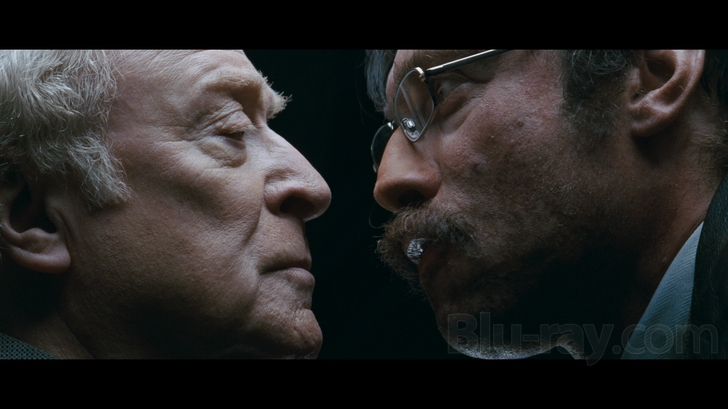
Setting is perhaps the most striking departure for this incarnation of Sleuth. Whereas the first film was set in an old English country house overrun with knick-knacks, Andrew's home in the new version is more like a permanent art installation or a catalog for German industrial design. The minimalist aesthetic on display spills into the stage-like cinematography, which is well represented by this clean, 1080p AVC MPEG-4 transfer in the film's original 2.35:1 aspect ratio. Sleuth is characterized by a stark, desaturated look that's interrupted by bold splashes of color from Andrew's complex lighting rig. The only real issue I noticed with the transfer is that some of these subtle color gradients, especially around harsh and vivid light sources, took on a slightly digitized, mottled appearance. The problem could be much, much worse, though, and I only really noticed it near the end of the film. That said, this is a crisp and pleasing transfer. Clarity is strong throughout, and close-ups—particularly of Caine's craggy face—show fine detail and well-attuned texture without evidence of over-sharpening. Black levels could be a hair deeper, but the film's contrast is otherwise spot-on and gives an adequate sense of depth. Andrew's artistic eccentricity gives Director Kenneth Branagh ample opportunity to use unusual lighting techniques and, if nothing else, the film does certainly have its share of unique visual cues.
Sleuth Blu-ray Movie, Audio Quality 
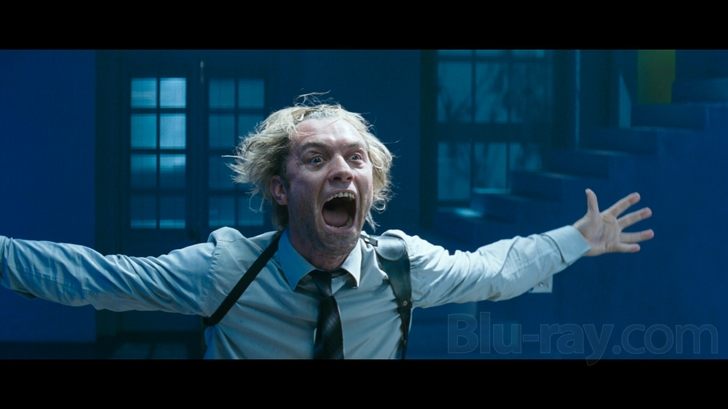
Sleuth's excellent Dolby TrueHD 5.1 track is an exercise in fitting restraint. While there's not much going on sonically in Andrew Wyke's tomb-like mansion, what we can hear is rendered with immaculate faithfulness. Dialogue reverberates throughout the mostly concrete chamber of Andrew's living room, and carries a clear and intimate presence. It's easy to feel like you're eavesdropping on Milo and Andrew's conversation, and the film is quite subtle in its quiet and immersive use of the rear channels. The dueling cello and piano of the score corresponds well to Sleuth's verbal fireworks, and is likewise represented with consistent fidelity. There are a few impressive moments when LFE-heavy bass weaves throughout the dialogue and underscores the tensions at hand. My only complaint, and really, hear me out, is that one of the score's motifs sounds like a slowed-down but note-for-note version of Marc Anthony's "I Need to Know." I'm not going to dock the score for this, obviously, but jeez I hate that song.
Sleuth Blu-ray Movie, Special Features and Extras 
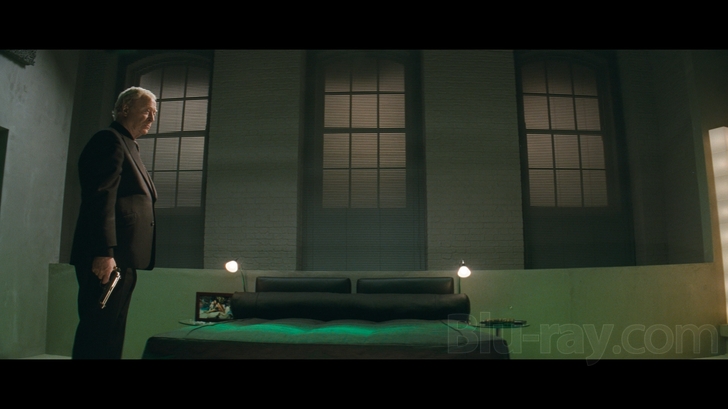
A Game of Cat and Mouse: Behind the Scenes of Sleuth (SD,
15:00)
Jude Law, Michael Caine, Kenneth Branagh, and Harold Pinter all show up here, and basically take
turns giving high compliments to one another. It's not the most interesting or enlightening
behind-the-scenes feature, but I did enjoy hearing Michael Cain talk about how he approached
the character of Andrew Wyke differently than Sir Lawrence Olivier. Sir Larry played him as a
"dangerous eccentric," he says, while he turned the role into a "murderous
psychotic."
Inspector Black: Make-Up Secrets Revealed (SD, 2:34)
Make Up Artist Eileen Kastner-Delago discusses the challenges of turning a very charismatic, very
distinctive-looking Jude Law into a different person.
Commentary by Kenneth Branagh and Michael Caine
Caine and Branagh give a fairly procedural commentary that's nonetheless enlivened by Caine's
playful self-deprecation and some real insights into the shooting of the film. I was particularly
interested by Caine discussing the original Sleuth and his comments on working with the
legendary Sir Lawrence Olivier. The two men are chatty throughout the track, and while not all of
the information is necessarily interesting, there's rarely a silent moment.
Commentary by Jude Law
Without a foil to work off of, Jude Law's commentary comes off as a bit dry. I would have much
rather preferred a single track with Law, Caine, and Branagh all discussing the film
together.
Trailers (1080p)
The disc includes HD trailers for Steep, Saawariya, The Jane Austen Book
Club, Across the Universe, 30 Days of Night, We Own the Night,
Closer, and The Holiday, though, oddly, not one for Sleuth.
Sleuth Blu-ray Movie, Overall Score and Recommendation 
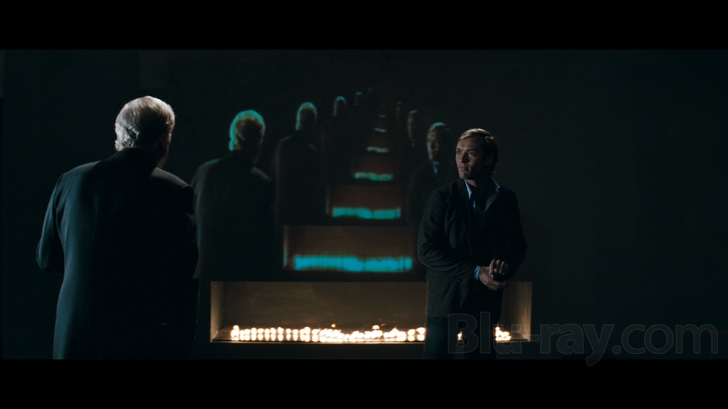
The remake is a tricky beast to tame. Play it with shot-to-shot sameness, like Gus Van Sant's Psycho, and the whole affair seems pointless. Deviate too far from the established story, however, and the director risks the ire of rabid fans. The Sleuth remake rests on the laurels of its well-respected creators, but the end result doesn't really justify the film's existence. It's unfortunate, because the first half of the film is genuinely gripping. Still, the new Sleuth will find its fans, and this well-equipped Blu-ray release is there for those willing to give it a chance.
Similar titles
Similar titles you might also like

Mystic River
2003

Secret in Their Eyes
2015

Gone Girl
2014

The Offence
1973

True Detective: The Complete Seasons 1-3
2014-2019

The Girl with the Dragon Tattoo
2011

Insomnia
2002

Swerve
2011

In the Electric Mist
2008

Stoker
2013

The Killers
1946

Changeling
Academy Awards O-Sleeve
2008

Sharp Objects
2018

Light Sleeper
1992

The Ghost Writer
2010

The Secret in Their Eyes
El Secreto de Sus Ojos
2009

Double Indemnity 4K
1944

Tinker Tailor Soldier Spy 4K
2011

The Manchurian Candidate
1962

The Girl Who Played with Fire
Flickan som lekte med elden
2009